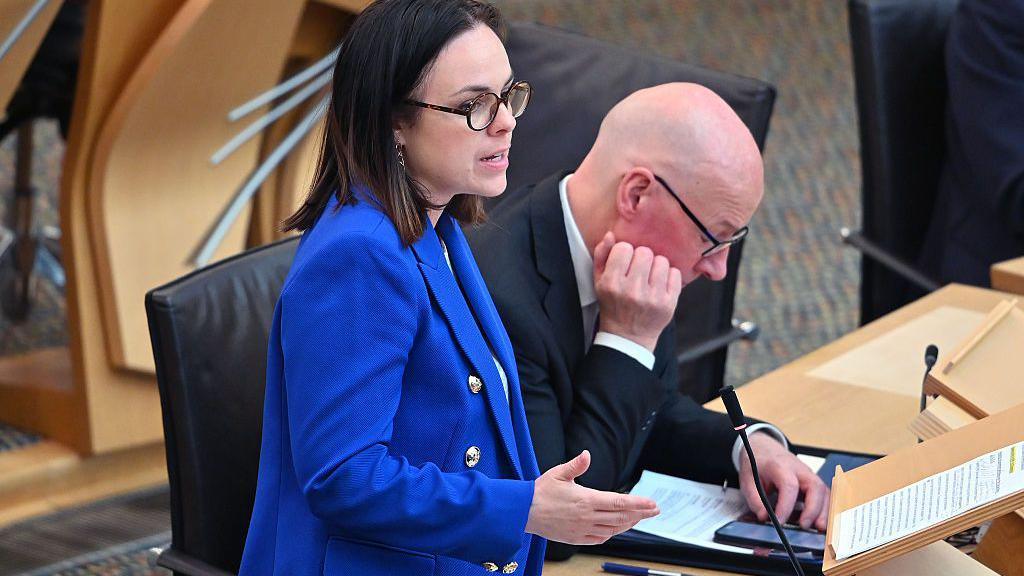Sturgeon excluded ministers from Covid decisions, inquiry says
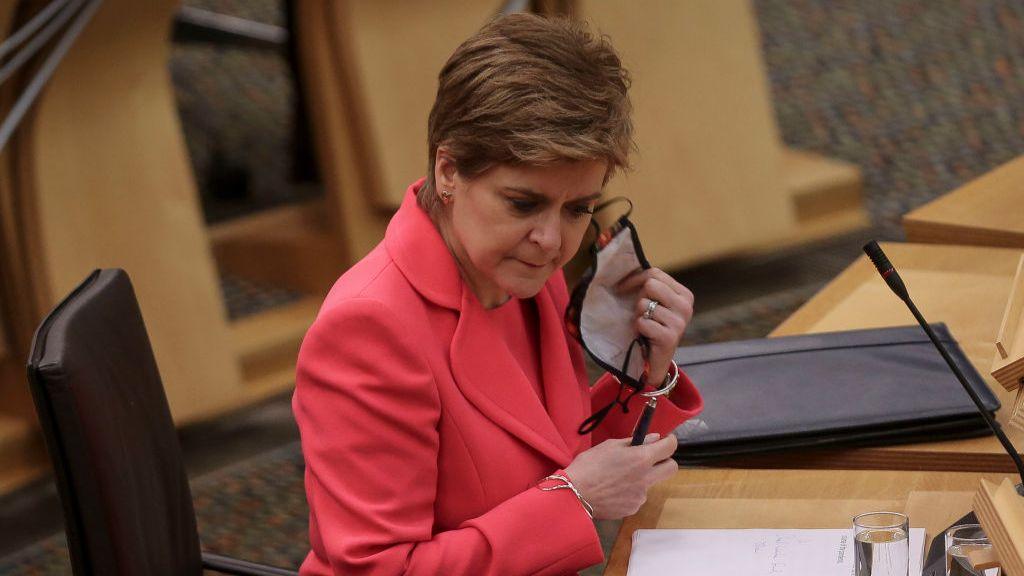
Former First Minister Nicola Sturgeon led Scotland's response during the Covid-19 pandemic
- Published
Nicola Sturgeon has been criticised for making decisions among a small group of advisers and ministers during the coronavirus pandemic.
The UK Covid-19 Inquiry praised the former first minister as a "serious and diligent leader", but said she "often excluded" some government ministers and advisers from key discussions.
Sturgeon said she acted in "good faith" and defended her decision to "lead from the front and make clear that the buck stopped with me".
A report by inquiry chairwoman Baroness Hallett said the Scottish government was too reliant on UK ministers to lead the response to the Covid-19 pandemic and was "significantly under-prepared" for what was to come.
It concluded that the response of all four governments in the UK to the virus "repeatedly amounted to a case of 'too little, too late'".
Baroness Hallett was damning of a "toxic and chaotic culture" at the heart of the UK government and said there was a "lack of trust" between ministers in Edinburgh and London, which she said coloured the approach to decision-making.
She added that strict lockdowns could have been avoided had voluntary restrictions and social distancing been introduced earlier – and that thousands of lives could have been saved by faster action.
No formal minutes
The report, which runs to more than 760 pages, works its way through the events of the pandemic in turn, examining political decision-making.
While it praised Sturgeon's approach to taking responsibility, it identified that ministers and advisers "were often excluded from decision-making", with important choices often made "outside the formal structures" of government.
A "Gold Command" group made up of Sturgeon and senior ministers and advisors - such as her deputy John Swinney - regularly met in advance of Scottish cabinet meetings, without any formal minutes being taken.
Sturgeon told the inquiry that these were "not decision-making meetings" - but the report rejects this, saying the use of this informal group "diminished the role of the Scottish cabinet and reduced the transparency of decision-making".
It highlighted that the decision to close schools in Scotland was taken by Sturgeon and Swinney alone - and that cabinet "should not have been sidelined" in this.
Sturgeon excluded ministers from Covid decisions, inquiry says
The report said the Scottish cabinet ended up ratifying decisions made elsewhere rather than being the "ultimate decision-making body" - in contrast to the Welsh government approach, where cabinet was "fully engaged throughout the pandemic" and decisions were made by consensus.
It also nods to the fact Sturgeon fronted 98% of Scottish government briefings broadcast to the public, suggesting that sharing the burden of communications would "reduce the risk of polarisation among members of the public".
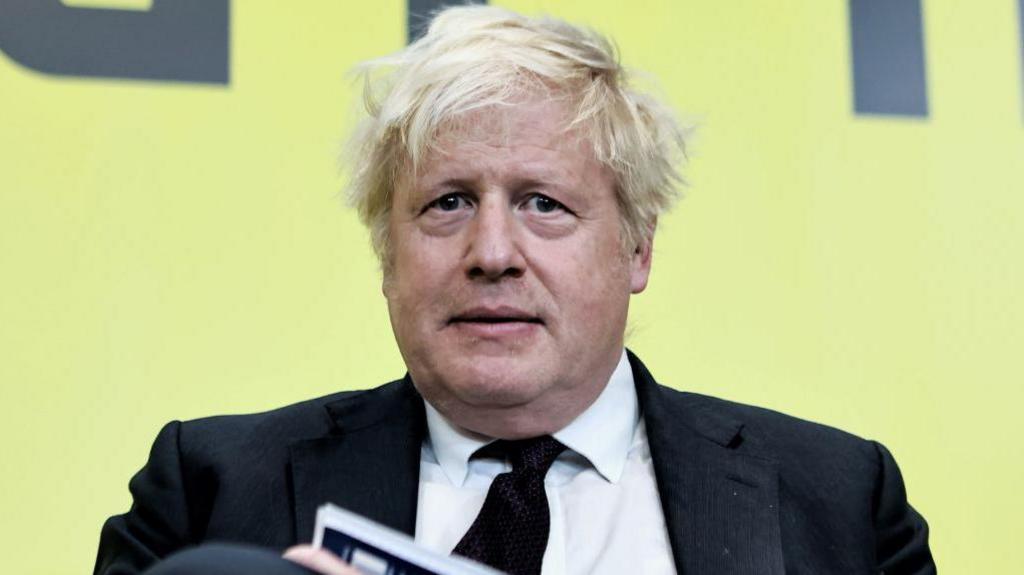
Boris Johnson's government was described as having a "toxic and chaotic" culture at its heart
The report was critical of Boris Johnson's leadership, talking about a "toxic and chaotic culture" at the centre of the UK government.
There were frequent political spats between the Scottish and UK administrations during the pandemic, with both sides claiming the other was trying to further political arguments.
Former Chancellor to the Duchy of Lancaster Michael Gove claimed that Scottish ministers occasionally viewed decisions "through a political lens" as to whether divergence from the UK approach would further the case for independence.
Missing WhatsApp messages
Meanwhile Sturgeon repeatedly clashed with Johnson, claiming that a visit he made to Scotland in July 2020 was used "as a political campaigning tool" for the Union.
The inquiry said it had found no evidence that either government "allowed political considerations to affect their pandemic-related decision-making".
However it said the relationship between Sturgeon and her UK counterparts was "poor", and that neither side had done anything to improve it.
It said the perception of political manoeuvring "hindered intergovernmental relations at a time when trust between the administrations was paramount".
There was little in the report about the use of WhatsApp by government ministers, despite criticism during the inquiry of the fact messages were routinely deleted.
It noted that Sturgeon would exchange direct messages on X, formerly Twitter, with health expert Prof Devi Sridhar to discuss the pandemic response, and was critical of the use of private channels for such talks.
However, it acknowledged that the Scottish government had since banned the use of mobile messaging apps by ministers, with corporate devices to be used for all official business.
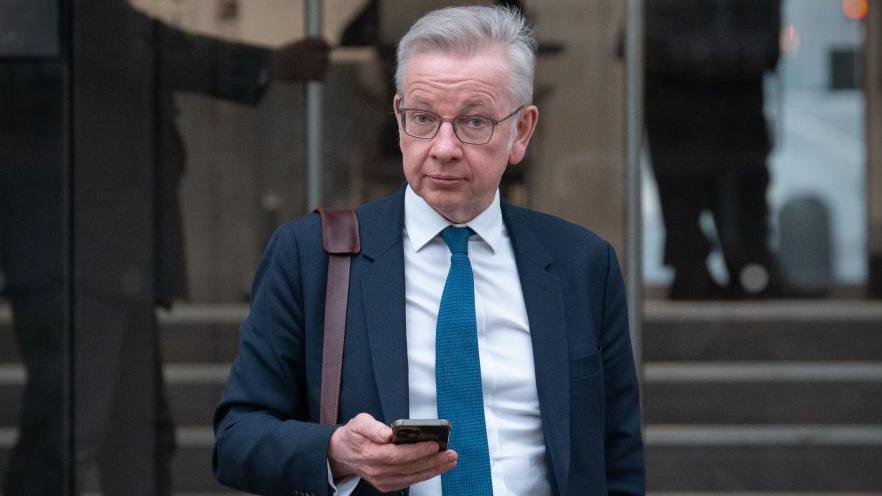
Michael Gove accused the Scottish government of being too political in its decision-making
Responding to the report, Sturgeon said it was "inevitable" that mistakes would be made due to the "unprecedented and uncertain" nature of the crisis.
"I have no doubt that I made my share of those," she told journalists in the Scottish Parliament.
"And that's a burden I will carry for the rest of my life."
The former first minister said that she made decisions on the "best advice and information" available at the time.
She insisted all ministers played a full part in decision-making, but that she made a "conscious decision" at the start of the pandemic to "lead from the front and to make very clear that the buck stopped with me".
Sturgeon said: "I stand by that decision and if time could be turned back I would make that decision again."
She also stood by her decision to front almost all of the daily briefings as part of her strategy to provide "visible and consistent leadership".
How many deaths could have been avoided?
The report said all four nations failed to take more immediate emergency steps in early 2020, when Covid-19 was beginning to spread worldwide.
The devolved administrations in Scotland, Wales and Northern Ireland were described as being "too reliant on the UK government to lead the response", having "failed to adequately conduct their own planning".
It said the Scottish government had "no real strategy" between January and March other than monitoring the spread of the virus.
The report found that by the time the possibility of lockdown was first considered across the UK, it was already too late and had become unavoidable.
It said 23,000 deaths could have been avoided in England alone had sweeping restrictions come in a week earlier.
The report acknowledged that leaders "were presented with unenviable choices" and "had to make decisions in conditions of extreme pressure".
And it said that "in a future emergency, leaders of each of the four nations should seek to minimise political division and prioritise collective working in the public interest".
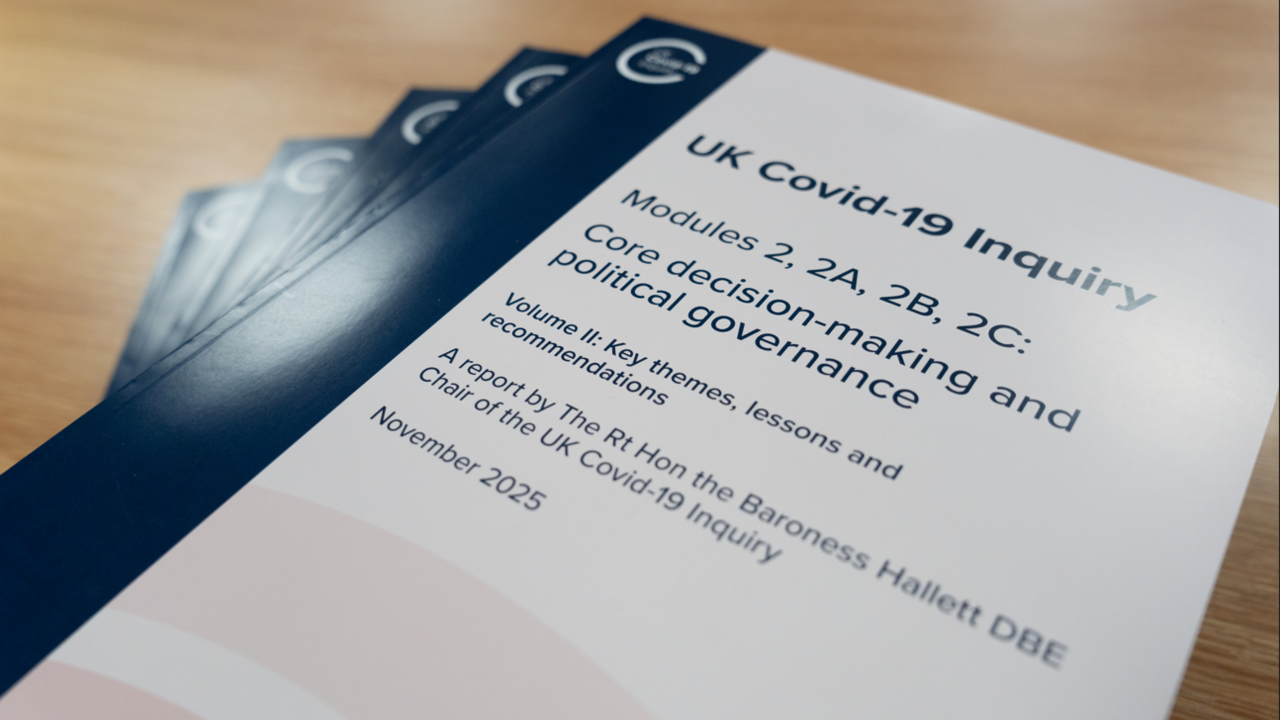
The report runs to more than 760 pages
Baroness Hallett ultimately backed the decisions that governments took to impose a mandatory lockdown - but said this "only became inevitable because of the acts and omissions of the four governments".
And she said the fact these mistakes were repeated later in 2020 was "inexcusable".
Once mandatory restrictions had been imposed at the end of March that year, the report says "none of the four governments had a strategy for when or how they would exit the lockdown".
It says the UK government took a "high-risk" approach to easing restrictions in England that summer, and that the more gradual approach in Scotland, Wales and Northern Ireland had reduced the chances of further lockdowns.
The report also praised the Scottish government for "the quick introduction of stringent, locally targeted measures" in the autumn of 2020.
Ultimately a further lockdown was imposed due to the spread of a new variant of the virus, and the report said "all four governments failed to recognise this threat and did not take action until infection levels were critical".
'Policy of secrecy and cover-up'
Responding to the report, Scottish Conservative MSP Murdo Fraser accused the Scottish government of "secrecy and cover-up".
"Nicola Sturgeon promised in 2021 that nothing would be off limits in providing evidence to a public inquiry – yet we know now that both she and John Swinney shamefully deleted their WhatsApp messages in an orchestrated effort to evade scrutiny," he said.
"That's on top of the fact that no minutes were kept of the Gold Command meetings between senior ministers and advisers where the key pandemic decisions were taken."
Scottish Labour's deputy leader Jackie Baillie said it was "clearer than ever" that the Scottish government was not prepared for a pandemic and "failed to take action quickly enough".
She added: "This report cements the central role John Swinney played in the SNP government's pandemic response and it is disappointing that he failed to come to the Parliament to make a statement and take questions on the report himself.
"The first minister owes the people of Scotland a real apology for the decisions he took at this time."
Following publication of the report, John Swinney posted on X: "My thoughts and heartfelt sympathies continue to be with everyone who lost a loved one to Covid-19 and who suffered so much disruption to their lives.
"It is vital we learn lessons and @scotgov will give the inquiry's findings and recommendations full and thorough consideration."
- Published20 June
